Ashwin Ram
Asymptotically optimal sequential change detection for bounded means
Feb 05, 2026Abstract:We consider the problem of quickest changepoint detection under the Average Run Length (ARL) constraint where the pre-change and post-change laws lie in composite families $\mathscr{P}$ and $\mathscr{Q}$ respectively. In such a problem, a massive challenge is characterizing the best possible detection delay when the "hardest" pre-change law in $\mathscr{P}$ depends on the unknown post-change law $Q\in\mathscr{Q}$. And typical simple-hypothesis likelihood-ratio arguments for Page-CUSUM and Shiryaev-Roberts do not at all apply here. To that end, we derive a universal sharp lower bound in full generality for any ARL-calibrated changepoint detector in the low type-I error ($γ\to\infty$ regime) of the order $\log(γ)/\mathrm{KL}_{\mathrm{inf}}(Q,\mathscr{P})$. We show achievability of this universal lower bound by proving a tight matching upper bound (with the same sharp $\logγ$ constant) in the important bounded mean detection setting. In addition, for separated mean shifts, we also we derive a uniform minimax guarantee of this achievability over the alternatives.
An Asymptotic Law of the Iterated Logarithm for $\mathrm{KL}_{\inf}$
Feb 05, 2026Abstract:The population $\mathrm{KL}_{\inf}$ is a fundamental quantity that appears in lower bounds for (asymptotically) optimal regret of pure-exploration stochastic bandit algorithms, and optimal stopping time of sequential tests. Motivated by this, an empirical $\mathrm{KL}_{\inf}$ statistic is frequently used in the design of (asymptotically) optimal bandit algorithms and sequential tests. While nonasymptotic concentration bounds for the empirical $\mathrm{KL}_{\inf}$ have been developed, their optimality in terms of constants and rates is questionable, and their generality is limited (usually to bounded observations). The fundamental limits of nonasymptotic concentration are often described by the asymptotic fluctuations of the statistics. With that motivation, this paper presents a tight (upper and lower) law of the iterated logarithm for empirical $\mathrm{KL}_{\inf}$ applying to extremely general (unbounded) data.
CrediRAG: Network-Augmented Credibility-Based Retrieval for Misinformation Detection in Reddit
Oct 15, 2024



Abstract:Fake news threatens democracy and exacerbates the polarization and divisions in society; therefore, accurately detecting online misinformation is the foundation of addressing this issue. We present CrediRAG, the first fake news detection model that combines language models with access to a rich external political knowledge base with a dense social network to detect fake news across social media at scale. CrediRAG uses a news retriever to initially assign a misinformation score to each post based on the source credibility of similar news articles to the post title content. CrediRAG then improves the initial retrieval estimations through a novel weighted post-to-post network connected based on shared commenters and weighted by the average stance of all shared commenters across every pair of posts. We achieve 11% increase in the F1-score in detecting misinformative posts over state-of-the-art methods. Extensive experiments conducted on curated real-world Reddit data of over 200,000 posts demonstrate the superior performance of CrediRAG on existing baselines. Thus, our approach offers a more accurate and scalable solution to combat the spread of fake news across social media platforms.
News Source Credibility Assessment: A Reddit Case Study
Feb 07, 2024Abstract:In the era of social media platforms, identifying the credibility of online content is crucial to combat misinformation. We present the CREDiBERT (CREDibility assessment using Bi-directional Encoder Representations from Transformers), a source credibility assessment model fine-tuned for Reddit submissions focusing on political discourse as the main contribution. We adopt a semi-supervised training approach for CREDiBERT, leveraging Reddit's community-based structure. By encoding submission content using CREDiBERT and integrating it into a Siamese neural network, we significantly improve the binary classification of submission credibility, achieving a 9% increase in F1 score compared to existing methods. Additionally, we introduce a new version of the post-to-post network in Reddit that efficiently encodes user interactions to enhance the binary classification task by nearly 8% in F1 score. Finally, we employ CREDiBERT to evaluate the susceptibility of subreddits with respect to different topics.
Annotating sleep states in children from wrist-worn accelerometer data using Machine Learning
Dec 09, 2023



Abstract:Sleep detection and annotation are crucial for researchers to understand sleep patterns, especially in children. With modern wrist-worn watches comprising built-in accelerometers, sleep logs can be collected. However, the annotation of these logs into distinct sleep events: onset and wakeup, proves to be challenging. These annotations must be automated, precise, and scalable. We propose to model the accelerometer data using different machine learning (ML) techniques such as support vectors, boosting, ensemble methods, and more complex approaches involving LSTMs and Region-based CNNs. Later, we aim to evaluate these approaches using the Event Detection Average Precision (EDAP) score (similar to the IOU metric) to eventually compare the predictive power and model performance.
Analysis, Identification and Prediction of Parkinson's disease sub-types and progression through Machine Learning
Jun 07, 2023Abstract:Parkinson's disease (PD) is a prevalent neurodegenerative disorder with varying patient trajectories, yet little is understood about the underlying causes and symptom progression. The Parkinson's Progression Markers Initiative (PPMI) has collected comprehensive longitudinal data from diverse patient cohorts to identify biomarkers and aid in the development of interventions. Despite over 110 machine learning studies using the PPMI database, the majority have focused on supervised models for diagnosis prediction, which has limited impact on understanding patient variability and progression. This paper addresses this gap by combining supervised and unsupervised machine learning methods to identify subtypes that accurately predict disease progression in Parkinson's patients. Building upon previous work, we replicate and extend the study by integrating unsupervised patient clustering and prediction of present and future symptoms using 5 additional years of longitudinal data from the Progressive Parkinson's Markers Initiative (PPMI) database. Our findings demonstrate accurate prediction of disease trajectories and symptoms at baseline, offering valuable insights into patient heterogeneity and the potential for personalized interventions. The integration of supervised and unsupervised models presents a promising avenue for uncovering latent subgroups and understanding the complexity of Parkinson's disease progression.
On Evaluating and Comparing Conversational Agents
Jan 11, 2018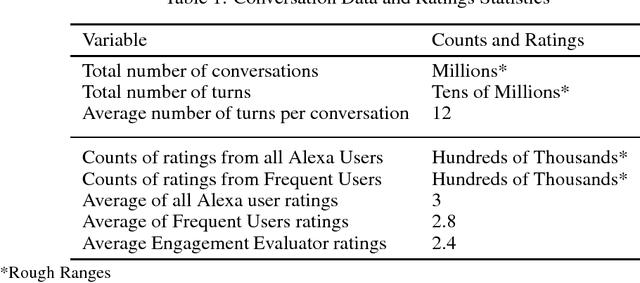
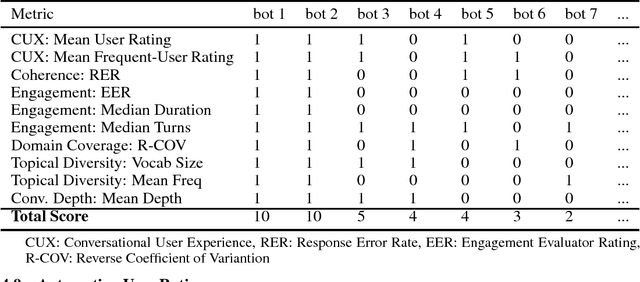
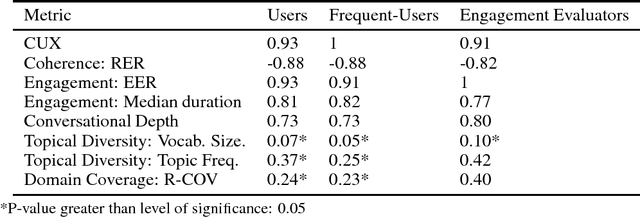

Abstract:Conversational agents are exploding in popularity. However, much work remains in the area of non goal-oriented conversations, despite significant growth in research interest over recent years. To advance the state of the art in conversational AI, Amazon launched the Alexa Prize, a 2.5-million dollar university competition where sixteen selected university teams built conversational agents to deliver the best social conversational experience. Alexa Prize provided the academic community with the unique opportunity to perform research with a live system used by millions of users. The subjectivity associated with evaluating conversations is key element underlying the challenge of building non-goal oriented dialogue systems. In this paper, we propose a comprehensive evaluation strategy with multiple metrics designed to reduce subjectivity by selecting metrics which correlate well with human judgement. The proposed metrics provide granular analysis of the conversational agents, which is not captured in human ratings. We show that these metrics can be used as a reasonable proxy for human judgment. We provide a mechanism to unify the metrics for selecting the top performing agents, which has also been applied throughout the Alexa Prize competition. To our knowledge, to date it is the largest setting for evaluating agents with millions of conversations and hundreds of thousands of ratings from users. We believe that this work is a step towards an automatic evaluation process for conversational AIs.
* 10 pages, 5 tables. NIPS 2017 Conversational AI workshop. http://alborz-geramifard.com/workshops/nips17-Conversational-AI/Main.html
Topic-based Evaluation for Conversational Bots
Jan 11, 2018
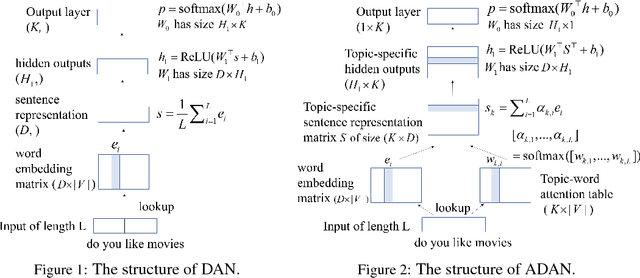
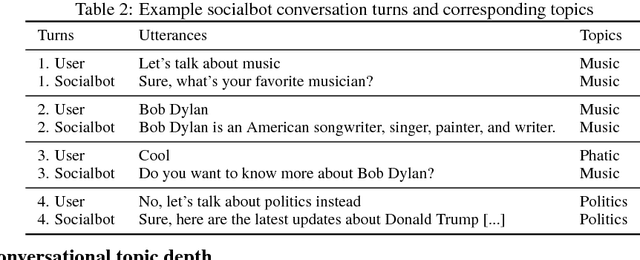
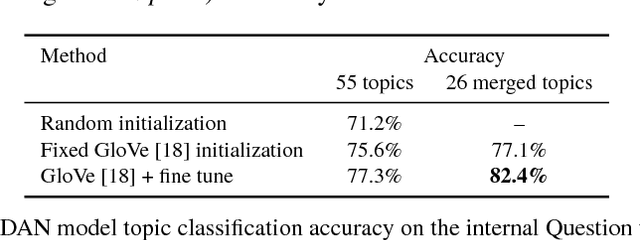
Abstract:Dialog evaluation is a challenging problem, especially for non task-oriented dialogs where conversational success is not well-defined. We propose to evaluate dialog quality using topic-based metrics that describe the ability of a conversational bot to sustain coherent and engaging conversations on a topic, and the diversity of topics that a bot can handle. To detect conversation topics per utterance, we adopt Deep Average Networks (DAN) and train a topic classifier on a variety of question and query data categorized into multiple topics. We propose a novel extension to DAN by adding a topic-word attention table that allows the system to jointly capture topic keywords in an utterance and perform topic classification. We compare our proposed topic based metrics with the ratings provided by users and show that our metrics both correlate with and complement human judgment. Our analysis is performed on tens of thousands of real human-bot dialogs from the Alexa Prize competition and highlights user expectations for conversational bots.
* 10 Pages, 2 figures, 9 tables. NIPS 2017 Conversational AI workshop paper. http://alborz-geramifard.com/workshops/nips17-Conversational-AI/Main.html
Conversational AI: The Science Behind the Alexa Prize
Jan 11, 2018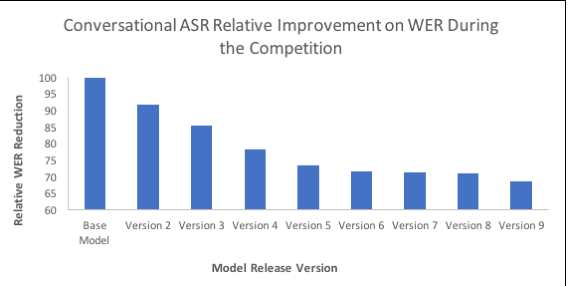



Abstract:Conversational agents are exploding in popularity. However, much work remains in the area of social conversation as well as free-form conversation over a broad range of domains and topics. To advance the state of the art in conversational AI, Amazon launched the Alexa Prize, a 2.5-million-dollar university competition where sixteen selected university teams were challenged to build conversational agents, known as socialbots, to converse coherently and engagingly with humans on popular topics such as Sports, Politics, Entertainment, Fashion and Technology for 20 minutes. The Alexa Prize offers the academic community a unique opportunity to perform research with a live system used by millions of users. The competition provided university teams with real user conversational data at scale, along with the user-provided ratings and feedback augmented with annotations by the Alexa team. This enabled teams to effectively iterate and make improvements throughout the competition while being evaluated in real-time through live user interactions. To build their socialbots, university teams combined state-of-the-art techniques with novel strategies in the areas of Natural Language Understanding, Context Modeling, Dialog Management, Response Generation, and Knowledge Acquisition. To support the efforts of participating teams, the Alexa Prize team made significant scientific and engineering investments to build and improve Conversational Speech Recognition, Topic Tracking, Dialog Evaluation, Voice User Experience, and tools for traffic management and scalability. This paper outlines the advances created by the university teams as well as the Alexa Prize team to achieve the common goal of solving the problem of Conversational AI.
* 18 pages, 5 figures, Alexa Prize Proceedings Paper (https://developer.amazon.com/alexaprize/proceedings), Alexa Prize University Competition to advance Conversational AI
 Add to Chrome
Add to Chrome Add to Firefox
Add to Firefox Add to Edge
Add to Edge